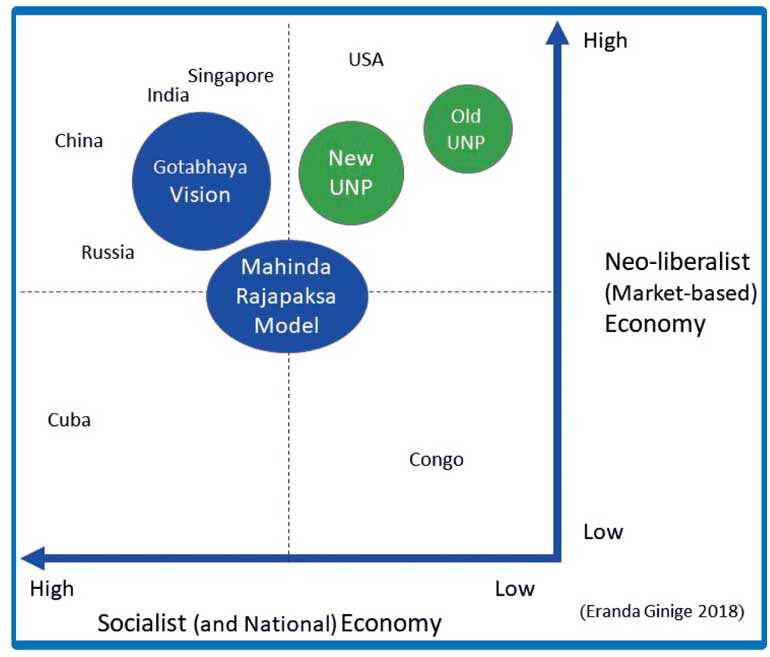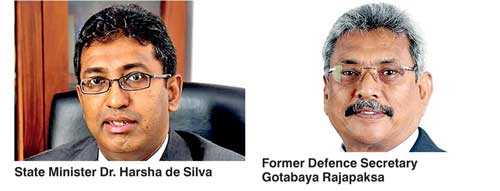Monday Feb 16, 2026
Monday Feb 16, 2026
Tuesday, 12 June 2018 00:00 - - {{hitsCtrl.values.hits}}

A reply to Dr. Harsha De Silva
Gotabaya Rajapaksa’s vision for a new economic model for Sri Lanka which was presented at the Viyathmaga Convention 2018 has sparked a discussion among all people in the society. Such civil discourse is important to create an informed citizenry.
State Minister of National Policies and Economic Affairs Dr. Harsha de Silva recently explained his views on the subject. As an educated economist, his explanation is an ideal opportunity for us to differentiate the economic policies of the two political camps in Sri Lanka. As citizens of a representative democracy played by political parties, it is critical that we have a good understanding about their economic policies.
Engine of growth
“Since ’77 we (UNP) call the private sector as the engine of growth in the country,” said Dr de Silva. Although this post-1977 economy is generally called the “Open Economy” the more suitable term is liberalism or neo-liberalist economy.
Neo-liberalism is the economic model which prescribes complete autonomy of the economy to the private sector with no or very limited government intervention. Privatisation, austerity (continuously reducing government spending on education, health and welfare), taxation, deregulation (removing rules and regulations), increasing competition, foreign direct investment and free trade are all definitive characteristics of a neo-liberal economy. Since it is entirely dependent upon “supply-and-demand” it’s also called a “market-based” economy.
As you know this has been the clear economic model of the UNP since 1977. According to them neo-liberalism is the only way to develop the country. Some (not all) western countries especially the USA used this economic model.
Losing faith
But even those countries have now come to realisation that neo-liberalism does not lead to the “development” we seek. Instead it has created an unimaginable gap between the rich and the poor leading to massive social injustice and irreversible environmental destruction. After the global economic crisis which started in 2008, most countries are becoming “less” liberal in their economic policy.
Britain voting to exit from the European Union’s open economy and the rise of the “America-first” economic model with President Donald Trump and his radical foreign policy in international trade are two explosive examples of this global shift.
Therefore, the neo-liberalists were compelled to somewhat change their theory. Their fall-back is “Social Market (-based) Economy,” which according to Dr. de Silva is the new economic model of the UNP leading up to 2025. In this model the government comes back to intervene in the private sector led economy to assure social justice to all citizens. This is essentially an acceptance of the failure of the neo-liberalist economy.
Evolution of the socialist economy
The SLFP together with its old socialist and new nationalist parties (except JVP) can be best described as “the camp opposed to the UNP’s economic policy”. That point right there is the only point at which these two camps and their people differ.
Having started with the old socialist (and nationalist) economic model, SLFP’s economic experiment comes to a defeat in 1977. Some of the large-scale state enterprises were privatised while the rest were bankrupted. Their economic policy only regains power with the start of Rajapaksa Government in 2005.
But there was a difference. Their economic model looked very different from the pre-1977 era. They seemed to support the private sector growth while intervening in the economy at the same time. Government taking back Sri Lankan airlines, controlling the rupee against the dollar are but a few examples. In other words, they have evolved into a “Socialist Liberal” economic model which is also called a “Mixed Economy”.
Centre-point
If you draw a line placing the neo-liberalism at the right end and the socialist economy at the left end, you find mixed economy at the centre-point. All this time the UNP was at the right end of this line. But this new “Social Market” economy which Dr. de Silva is talking about is closer to former government’s mixed economy.
But I think it’s still right-leaning from the centre because he says they “will bring social justice by improving the efficiencies of the private sector”; carefully chosen words. If that is true, then I’m pleasantly surprised by this radical change in the UNP’s economic policy!
The “Socialist Market” economy which Gotabaya Rajapaksa is proposing is I think left-leaning from the centre. Because he says in his speech, “While growing the economy through socialist market-based model, the sovereignty and the culture of the country must be preserved.” He needs to further elaborate on his vision and engage in public discourse.
This is why the UNP’s 2025 economic model and Viyathmaga 2030 economic model look similar on the first glance. Both sides are near the centre but leaning to either side. That subtle but hugely important difference must be understood by the citizens (although I used a linear example for ease of explanation, the more appropriate analysis should be made using the below matrix).
What is equally important to policy is the ability to implement them. Gotabaya Rajapaksa’s speech should not be taken in isolation but compared with the rest of the speakers at the Viyathmaga convention. For example, my speech about social innovation and building a futuristic social enterprise sector should be discussed in this context as a practical way for his model. The need for a wide platform to discuss and debate these ideas and more has never felt more important than now.
False interpretations
It was unfortunate that Dr. de Silva limits his explanation to a petty political agenda towards the end. He conflates local context with China and its communist party. His cheap attempt to create a false fear among the private sector leaders here, undermines his professionalism. I’m sure he knows about the massive reforms taking place in the Chinese state-enterprise sector. And he should know that even their own golden standard, the Government of Singapore owns more or less some of the biggest enterprises in their country and abroad.
Many European governments and the richest Middle Eastern governments own some of their largest enterprises. They earn large profits by managing those state-enterprises competitively and efficiently. That profit is reinvested in the welfare of the citizens of their nations through education, health, energy, transport and even to support the private sector.
And those countries also actively promote the growth of their private sector which supports the development of their nation. Their economic policy interventions keep the welfare of their people and the integrity of their country at heart. Which is why even during the worst times of the recent recession, the UK kept on investing in their Social Enterprise sector. In fact, they all follow “Socialist Market-based” economy. They just use different strategies. It’s just that they don’t admit it due to their antipathy to the word “socialist”.
Truth and falsity
As you can see, Gotahaya Rajapaksa’s economic vision is more progressive than even that of the Mahinda Rajapaksa Government. It opens up completely new possibilities for innovating and future-proofing our economy and to discuss concepts like Social Enterprise, Universal Basic Income, and Impact Investing.
If we are to fear about anything, then it should be about what President Maithripala Sirisena spoke recently. He said, if it wasn’t for him and his SLFP Members of Parliament, there would be no Bank of Ceylon, People’s Bank or National Savings Bank by now. Was he trying to tell us how he prevented the UNP’s neo-liberal tactics of privatisation of State banks?
Is this “Social Market” makeover of the UNP genuinely truthful? Or is it just another deceitfully-elegant term like “Good Governance” taught to them perhaps by their foreign masters? But if it is the truth, then they must prove it with practical action. But whether they have enough time for that is another question.
(The writer is a Social Entrepreneur and Ambassador for Democracy Earth.)